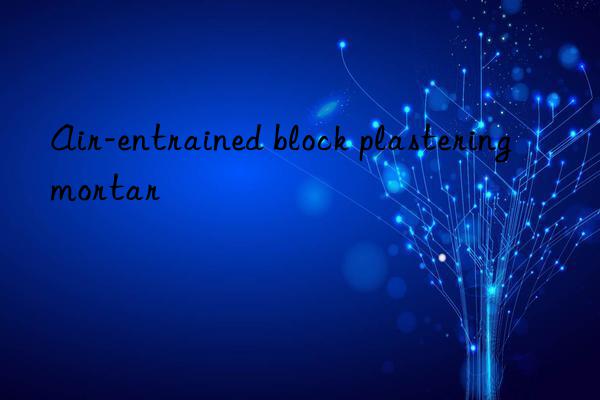
1. Product introduction:
Air-entrained block plastering mortar is mainly used to solve the problems that often occur after traditional cement mortar is plastered on a high water absorption base layer, such as poor adhesion, unstable quality, and hollowing of the plaster layer. A new type of building material developed to prevent cracking and other phenomena. This product has low plastic shrinkage and drying shrinkage, which reduces the early plastic shrinkage cracks of the mortar, improves the impermeability, frost resistance, and wear resistance of the mortar, thus inhibiting the generation and development of cracks, thereby achieving waterproofing and barrier properties. cracking, toughening, strengthening and other functions. It has good construction performance, easy operation, and will not cause bleeding and segregation.
2. Scope of application:
1. Suitable for aerated concrete blocks, lightweight boards, lime sand bricks, clay porous bricks, concrete hollow blocks, ceramsite bricks, etc. Plastering construction of interior and exterior walls of various highly absorbent wall materials.
2. Plastering construction of reinforced concrete shear walls, beams, columns and slabs.
3. After the bottom plastering is completed, mesh cloth can be added for reinforcement when using surface waterproof plastering mortar.
3. Construction instructions:
1. Base layer treatment: Check that there are no hollows, oil stains, release agents, floating dust, loose holes, etc. on the surface of the base layer.
2. Ingredients: Calculate the required clean water according to the water-cement ratio of powder: water = 4:1. Slowly add the air-entrained block plastering mortar to the water, stir while adding, until uniform. According to the on-site The water-cement ratio can be appropriately adjusted according to specific construction practices. Let it sit for 5-10 minutes and stir evenly before use.
3. Construction method: If plastering is performed by hand, the thickness of each application should not exceed 10mm to ensure good bonding between the mortar and the base layer. When the thickness exceeds 15mm, it is recommended to plaster in stages. If mechanical spraying is used, use a long scraper immediately after spraying to remove excess material. After the mortar has initially set (about 1-2 hours, depending on the site), use a scraper to finish.
4. Reference dosage: The plastering thickness is 10mm, and the dosage is 10-12kg/m2.
V. Notes:
1. The mixed aerated block plastering mortar should be used up within 2 hours. The dried mortar should be discarded and no waste should be allowed. Dough.
2. During construction, smoothing, calendering, and roughening should be completed before final setting.
3. During plastering construction and the following three hours, the ambient temperature should not be lower than 5℃. Within 48 hours after the construction is completed, the maximum ambient temperature should be higher than 0℃. The temperature and wall temperature during construction should be When the body temperature is lower than negative temperature, thermal insulation measures should be taken.
6. Storage and transportation:
1. This product is non-toxic, odorless, pollution-free, environmentally friendly and energy-saving, and can be transported as general cargo.
2. Store in a cool and dry environment, avoid rain and moisture, and keep for six months.
3. Packaging specifications: 50 kg/bag.
</p



 微信扫一扫打赏
微信扫一扫打赏
